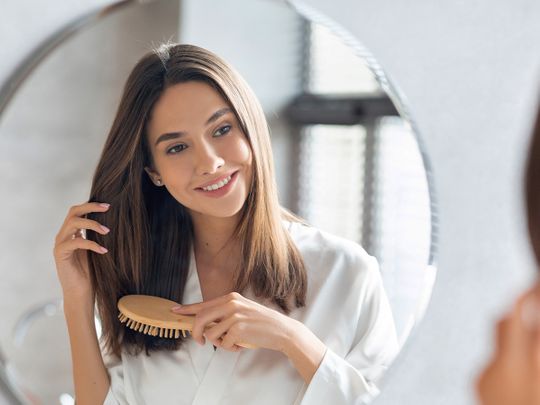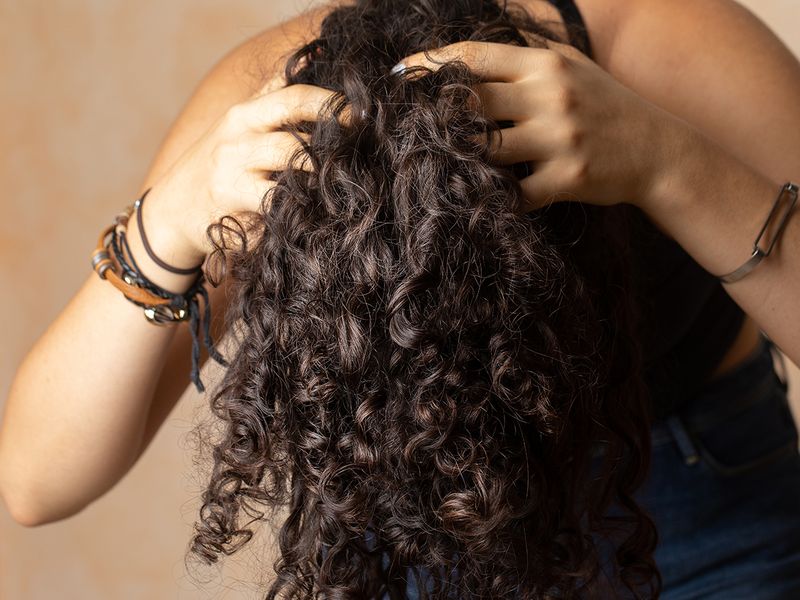
How often have you run for haircuts and then felt a sense of existential crisis because you realised that you actually wanted long hair? Yet, you know you went for a haircut because your long hair was nothing like the fairytale character Rapunzel; it felt straggly and full of split-ends. And, if you were anything like me, you would have spent the next couple of days morosely searching on the internet for tips on how to grow long and healthy hair.
If you’ve often been in that situation, be it being upset about a haircut that doesn’t go as planned, or if you’re unable to get it past your shoulder length, we’ve got some solutions for you.
Eat a healthy and balanced diet

At the risk of sounding clichéd, a healthy and balanced diet is key for strong and healthy hair growth. Your hair needs the right amount of nutrients to grow, which includes lots of protein and complex carbohydrates, explains Michael Ryan, a Dubai-based trichologist from Wellth clinic.

Your hair needs the right amount of nutrients to grow. So have a diet which includes lots of protein and complex carbohydrates..
As the hair growth is highly sensitive to sudden dietary changes, it’s best to avoid skipping meals or other restrictions, which aren’t based on the advice of a doctor. So for your breakfast and lunch, look for a commendable portion of complex carbs to add to your meal, including foods rich in iron, Vitamin B-12 and zinc. For example, a diet with fish, nuts, yoghurt, and beans along with wholegrains would do well for your hair. If you think that your diet isn’t giving you enough nutrients, you can also use the right supplements, like multi-vitamins, protein and mineral supplements that provides your hair with extra support for growth.
Avoid unnecessary strain on the hair
Be careful of how tightly you tie your hair. “Unnecessary strain on the hair needs to be reduced; such as tight ponytails, or hair extensions that pull excessively on the hair and weaken the hair,” says Dubai-based hairstylist Ilona Arebo. “Look for more lightweight options that would allow for strong healthy hair growth,” she adds.
Scalp care and scalp treatments

If your scalp isn’t in good condition, your hair won’t grow well. Healthy hair begins at the scalp, so if you have a flaky scalp, this will have a rather negative effect on the quality and durability of the hair strands as it emerges from the hair follicles. “Keeping the scalp clean is the best thing you can do on a regular basis,” explains Arebo. Inculcate a regular scalp-care routine, cleanse regularly with shampoo, advises Ryan. This frequent shampooing moisturises and strengthens the scalp, contrary to popular opinion, as he says. It rids the scalp of excess residue and oils.
Healthy hair starts at the scalp, therefore keeping the scalp clean is the best thing you can do on a regular basis. I recommend periodically de-mineralising and removing stubborn oil, and product residue from the hair follicles which get blocked and prevent healthy hair growth...
A good scalp massage works wonders, as it stimulates circulation and increases blood flow to the scalp. It contributes to removing residue and the build-up of dead skin cells. So you can opt for a scalp scrub or a serum. Arebo advises the use of rosemary oil, as it is said to stimulate hair growth, according to recent research. You can add a few drops of rosemary oil, tea tree or lime oil into your shampoo. Apply hair oils like coconut, sunflower or castor regularly, as they help to moisturise your hair.
Take care of your hair after a wash

Washing your hair isn’t the problem, it’s what you do after that, explains Arebo. If you do not dry your hair after a wash, the water droplets tends to stay in your hair, which swells and stretches the hair shaft. Worse, if you try to brush it in that state, your hair will break more easily. So to avoid this, apply conditioner from the root to the tips, use a wide-toothed comb, working from the ends to prevent the hair from tearing.
Stress management
Literally, keep your hair on.
High-stress levels impact hormone levels, and they can also lead to scalp irritations. Several studies have shown that stress and anxiety can cause hair loss. But there are ways to keep hair healthy and thick without losing your hair," explains Faisal Ahmed Hammadi, a UAE-based trichologist, from PowerYourCurls, a hairstyling platform. People can learn relaxation techniques such as meditation or yoga. Regular exercise can also manage stress and its effects, he adds.

Several studies have shown that stress and anxiety can cause hair loss. But there are ways to keep hair healthy and thick without losing your hair. People can opt for relaxation techniques such as meditation and yoga...
Get a frequent trim
It might sound counter-productive, but regular trims prevent the growth of split-ends in your hair strands. Split-ends occur when your hair strands become frayed, dry and brittle owing to several reasons, including changes in weather and over-use of techniques such as blow-drying, straightening or hair-curling. These split-ends can result in your hair losing length,volume and smoothness. Arebo also advises against the frequent use of too many chemical-based products on the hair such as dyes, as it not only affects the growth of the hair, it can lead to split-ends.
In order to avoid breakage, avoid excessive heat styling as well, as it leads to frizz. The fewer chemicals on your hair, the better, so lay off the bleach as well, as it leads to more breakage and split-ends.












